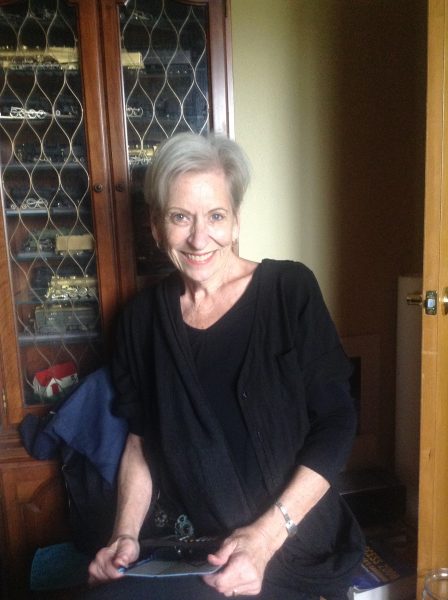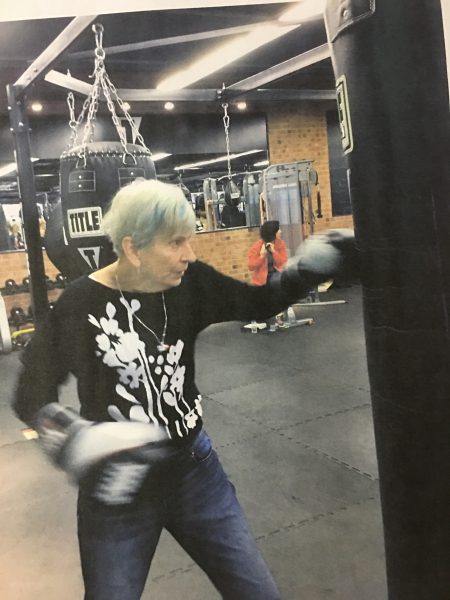 By Brooke Poulson, SMTD Publicity Intern
By Brooke Poulson, SMTD Publicity Intern
Music is known as one of the most influential mediums.It has brought together people from diverse backgrounds, it has united enemies, ultimately is has shaped society into what it is today. From a historical perspective we have always created, enjoyed, and lived with music. So, when we try to comprehend the amount of influence music has on our lives, it may not actually be fully understandable, but, for some, they recognize the physical influences or alterations that music has had on them. Out of the seven billion people living on earth, ten million are diagnosed with Parkinson’s disease. Out of those ten million people with the condition, I was able to meet one of the most incredible ones.
Willa Mac Pawlikowski or “Billie” has Parkinson’s disease, but she sees it far differently than how her doctors define it as, not a disease at all, actually. She believes that the condition is one of her life’s best gifts, and music is one of the best medicines. Parkinson’s may denotatively mean a progressive disorder of the nervous system that affects movement, but to Billie, her movement was simply just being redefined when she was diagnosed. Being an observer of CSU Music Therapy’s Parkinson’s singing group, I was lucky enough to be introduced to Billie. Before I even met her face-to-face, I was inspired by her, and I think that says a lot. Billie may be retired now, but her youthful charm is contagious, really everything about her is contagious. She was formally diagnosed with Parkinson’s in 2013, but she knew long before that she had the condition. Of five first cousins in her family, all were diagnosed with Parkinson’s, herself included.
Hearing her talk about it, Billie makes Parkinson’s sound like a blessing, and it literally has been, to her. She worked as a nurse and an elementary and secondary school teacher before retiring around the time of her diagnosis. Through her various careers, she found that there are four magic words in life: music, movement, friends, and humor, all values that have become prominent aspects of her daily experience with Parkinson’s.
She also believes that every job and stage of life has led her to where she is today, and that all of those stages were necessary. “I worked with brilliant, brilliant people and I always learned something from all of them. I looked to the one who was better than me,” she described when asked about her role models. She explained that some people look to the ones who are less than them so they can put themselves on a pedestal, but real learning occurs when you look to the one who is better than you, feeding off their knowledge.
As mentioned, Billie attends the Parkinson’s singing group at CSU and also sings in the Silvertones Senior Choir, an outreach program of the Larimer Chorale. She will begin teaching a class in July that talks to children about Alzheimer’s, Dementia, and Parkinson’s, and attends several other Parkinson’s support groups; on top of that, she is one of the founders of the Parkinson’s Advocacy Group of Larimer County. Involvement is key for her, and these groups are important because of the relationships and connections constantly being built. Not to mention, all participants agree that there is no room for negativity, which is exactly the type of environment where improvement can thrive.
Billie shared with me the small, but significant improvements she has experienced. Before she began going to support groups, she could not even get up. “I am a completely different person, that’s why we sing, not because we’re good, but because we need to. If you use your voice, articulate, and exercise the muscles, you can avoid aspiration pneumonia, which is one of the first things Parkinson’s patients develop with the condition,” she answered about her experience going to CSU’s Parkinson’s singing group. Billie believes that mind over body is a make or break attitude for any condition, which is why she is very active with meditation singing, dancing, Tai Chi, and even boxing. Her experience working in the medical field, and seeing many conditions first hand, has helped her realize the ways in which she wants to handle her own condition. “This is nothing compared to what others have. You see 24-year-old men who have come back from Iraq who lost their legs, and I’d think this is nothing,” she explained.
 Even though Billie was given the condition of Parkinson’s, she was given something else, her life’s purpose, which she has found is giving back to the community by sharing her experiences, knowledge, and insight, while continuously maintaining a strong supportive environment for others. Since her formal diagnosis in 2013, Billie’s involvement in the Parkinson’s community has already made undeniable impact. Billie has found her purpose, discovered new hobbies, made lifelong friends, and even in the short time we spent together, made me change my outlook on life. Her go-to life motto is a quote by Mark Twain that reads, “The two most important days in your life are the day you are born and the day you find out why.”
Even though Billie was given the condition of Parkinson’s, she was given something else, her life’s purpose, which she has found is giving back to the community by sharing her experiences, knowledge, and insight, while continuously maintaining a strong supportive environment for others. Since her formal diagnosis in 2013, Billie’s involvement in the Parkinson’s community has already made undeniable impact. Billie has found her purpose, discovered new hobbies, made lifelong friends, and even in the short time we spent together, made me change my outlook on life. Her go-to life motto is a quote by Mark Twain that reads, “The two most important days in your life are the day you are born and the day you find out why.”
Billie has certainly found out why, and is inspiring one person after another to find their purpose as well.

